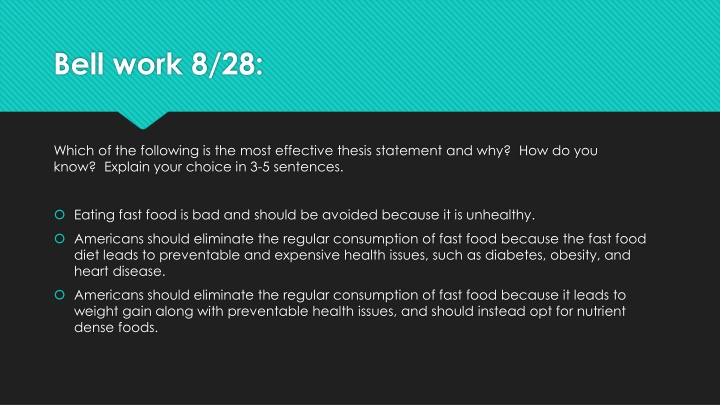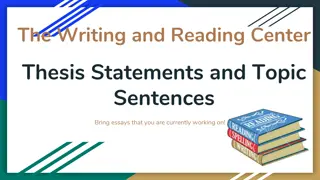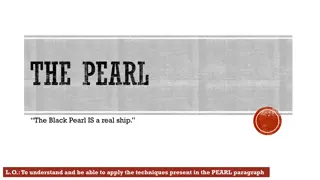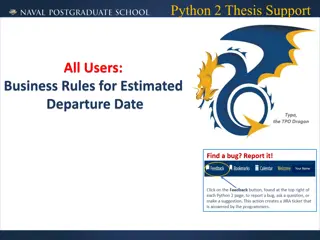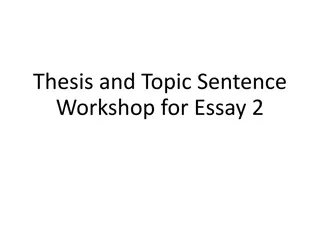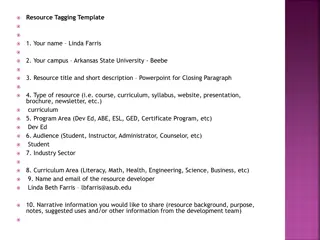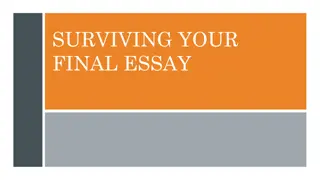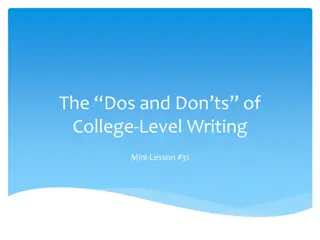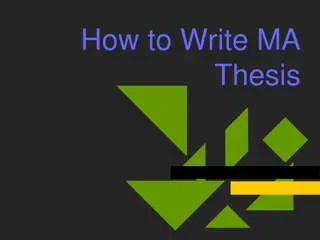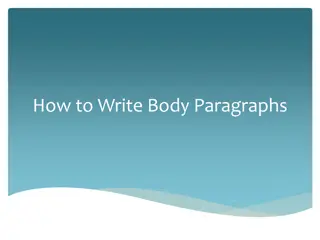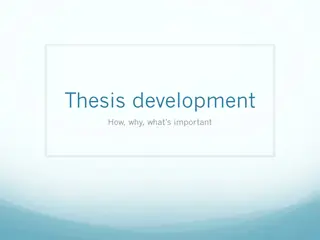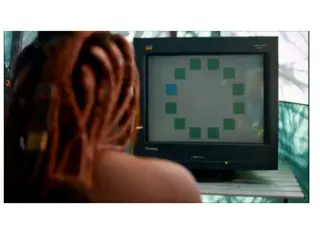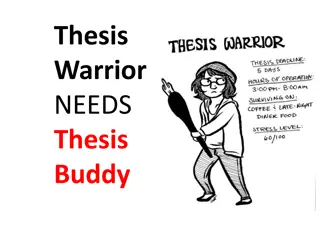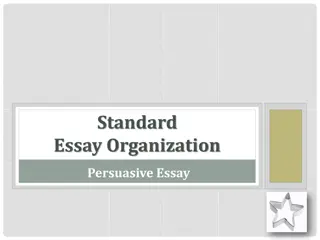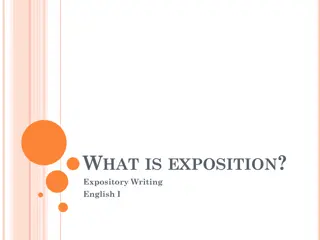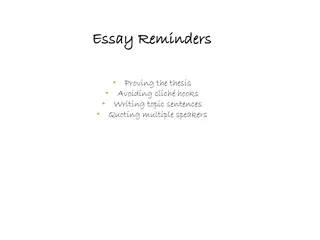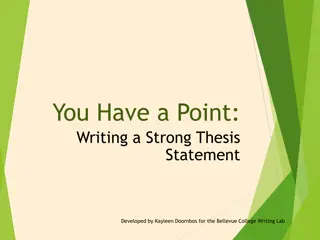Crafting Strong Thesis Statements and Paragraphs for Effective Writing
Learn to create powerful thesis statements and build strong paragraphs using the Statement/Proof/Analysis format. Understand how to choose the most effective thesis statement by analyzing examples and explanations. Enhance your writing skills with techniques for attention-grabbing introductions and detailed analysis in your writing.
Download Presentation

Please find below an Image/Link to download the presentation.
The content on the website is provided AS IS for your information and personal use only. It may not be sold, licensed, or shared on other websites without obtaining consent from the author.If you encounter any issues during the download, it is possible that the publisher has removed the file from their server.
You are allowed to download the files provided on this website for personal or commercial use, subject to the condition that they are used lawfully. All files are the property of their respective owners.
The content on the website is provided AS IS for your information and personal use only. It may not be sold, licensed, or shared on other websites without obtaining consent from the author.
E N D
Presentation Transcript
Bell work 8/28: Which of the following is the most effective thesis statement and why? How do you know? Explain your choice in 3-5 sentences. Eating fast food is bad and should be avoided because it is unhealthy. Americans should eliminate the regular consumption of fast food because the fast food diet leads to preventable and expensive health issues, such as diabetes, obesity, and heart disease. Americans should eliminate the regular consumption of fast food because it leads to weight gain along with preventable health issues, and should instead opt for nutrient dense foods.
15 minute Bell work 12/1: In your notebook, please answer these questions: What are the two traits you chose to describe your character? What two pieces of textual evidence did you find that represents these traits in your character?
Introductory Paragraph: Using my example as a model, you will write an introduction for your character that includes ALL 3 components below. I will approve these before you leave. Begin with an interesting grabber (question, quote, short, thought-provoking statement). Include the name of the play, along with the author s FULL NAME. You must have a thesis about your character. Example: The role of women in literature has served as a reflection of their place in society. Often times, these roles are indicative of the subordinate place women are given in respect to their male counterparts. In William Shakespeare s Hamlet (1992), Ophelia is an example of a female character who operates within rigid gender roles. True to her time period, she is a woman living in the Elizabethan era who is restricted from having full autonomy. Throughout the play, Ophelia is obedient to the commands of the men in her life, which yields her as a meek and submissive character.
Introduction Quick-Stop Workshop You need two different colors (pens/highlighters). Trade with the person to your right. HIGHLIGHT the ATTENTION-GRABBER in color 1. UNDERLINE the play title, author's name, and publication date in any color. HIGHLIGHT the THESIS in color 2. Q1: Is the attention-grabber effective and interesting? If not, what can they change? Q2: Does the thesis state two traits about their character and why? If not, please make a suggestion for a stronger thesis.
Statement/Proof/Analysis A guide to building strong paragraphs
Why do we use SPA? Statement Proof Click to add text Click to add text Click to add text The SPA format helps us create clear paragraphs with a thesis, evidence, and thoughtful analysis Analysis This triangle gives us a good idea of the proportions of the finished paragraph.
Step 1: Statement = topic statement + thesis The statement informs the reader of the subject while making an argument/asserting a view EX: A scene that highlights Ophelia's meek nature is Act 1, scene 3, wherein Polonius, her father, commands her to refrain from pursuing a relationship with Hamlet. Ex: HHS cafeteria food is overpriced and low quality.
Step 2: Proof Evidence supporting the statement Data/ statistics, textual evidence Ex: Polonius, in a stern command, says "I would not, in plain terms, from this time forth,/Have you so slander any moment leisure,/As to give words or talk with the Lord Hamlet (I.iii.132--135), to which Ophelia replies, "I shall obey my Lord" (I.iii.136). Ex: Prices have gone up from $2.25 in 2007, to $3.75 in 2015 (HamiltonHuskies.com).
Step 3: Analysis Explain how the proof supports the statement Include your thoughts (preferably based on ethos/pathos/logos) on why this has occurred, how it affects the audience, or possible solutions. Ex: Ophelia, performing her role as a dutiful daughter, promises she shall do as she is told. However, from her few lines in the conversation, it can be seen that while Ophelia is unsure of her relationship with Hamlet, she believes he speaks genuinely. Why does she not stand by this belief then? Ophelia's quick obedience to Polonius demonstrates a submissive character who casts her true interests aside at the first command. Due to the unreasonable $1.50 increase in food prices, students are less likely to eat in the cafeteria. Ultimately, making the food less affordable has a negative impact on the school's overall revenue.
Easy as 1, 2, 3... Statement/topic Sentence: A scene that highlights Ophelia's meek nature is Act 1, scene 3, wherein Polonius, her father, commands her to refrain from pursuing a relationship with Hamlet. Proof: Polonius sternly commands, "I would not, in plain terms, from this time forth,/Have you so slander any moment leisure,/As to give words or talk with the Lord Hamlet (I.iii.132--135), to which Ophelia replies, "I shall obey my Lord" (I.iii.136). Analysis: Ophelia, performing her role as a dutiful daughter, promises she shall do as she is told. However, from her few lines in the conversation, it can be seen that while Ophelia is unsure of her relationship with Hamlet, she believes he speaks genuinely. Why does she not stand by this belief then? Instead, Ophelia's quick obedience to Polonius demonstrates a submissive character who casts her true interests aside at the first command.
Quick-Stop Workshop: Body Paragraph 1&2 You will need two different highlighters. HIGHLIGHT the one-word CHARACTER TRAIT that is being analyzed in body paragraph 1 (ex: arrogant, foolish, indecisive, brave, etc.) In the same color, HIGHLIGHT the PROOF (textual evidence) that shows this trait In the 2nd color, HIGHLIGHT the ANALYSIS. Q1: Does the proof effectively show how the trait is present in the character? Q2: Does the analysis explain how the proof demonstrates this trait in the character? Do they refer back to the quote itself?
12/6 Wrapping it up: Conclusion Tips 1: Rephrase your thesis sentence. Paraphrase each of your topic sentences and remind the reader of one or two pertinent examples for each. 2:You might want to use a quotation which you feel perfectly presents your character or to inject humor. 3: You might want to ask a question for the audience to think on further. Ex: Ultimately, these moments in the play render an Ophelia that is meek and submissive; she is a woman subject to Elizabethan gender norms, after all. Her actions, or lack thereof, reinforce Ophelia as a subservient character. Her eager compliance to the men in the play, like Polonius and Laertes, make it difficult to read Ophelia as a person with any kind of autonomy. In fact, it is that which Shakespeare takes away from her: free will. Ophelia is at the whim of the actions of the men around her, actions which eventually lead to her death.
12/7 Socratic Seminar 1. Number each paragraph of the article. 2. Summarize each paragraph in one sentence. 3. HIGHLIGHT ONE EXAMPLE OF EACH ETHOS, PATHOS, LOGOS. Write your name on the article and turn into the bin before you leave. Q-Focus "Teens are people with sharp brains, they are just not sure what to do with them." The article will be your resource for the Socratic seminar. Please refer back to the article for textual evidence.
...and then voil! HHS cafeteria food is overpriced considering its low quality. Prices have risen from $2.25 in 2007, to $3.75 in 2015 (HamiltonHuskies.com). Due to the $1.50 increase in food prices and poor quality, students are less likely to eat in the cafeteria. Ultimately, increasing food prices for students has a negative impact on the school's overall revenue.
Closing Task: "Giving Life After Death Row" (Longo, 2011) Task 1: Partners Task 2: Ticket-Out-The-Door Individually and on your own sheet of paper, combine STATEMENT and PROOF With your partner, decide who will be #1 and #2 #1's will look for STATEMENT in the article Then you will have 10 minutes to add a thoughtful analysis like the one demonstrated earlier. #2's will look for PROOF in the article Work together to make sure your STATEMENT and PROOF correspond with each other. Turn the completed SPA paragraph into the bin before leaving!
Jamie Oliver TED Talk Ticket-out-the-Door SOAPSTone Rhetorical Analysis On a sheet of paper evaluate: SPEAKER OCCASION AUDIENCE PURPOSE SUBJECT Tone You must use details from the speech On the same paper evaluate: Ethos Pathos Logos Author, audience, and purpose are included in SOAPSTone Use details from the speech
APA Color-Coding Revision Workshop (Get into pairs) Statement (tells us which appeal and makes a claim about how the appeal is used = underline in blue or black ink Proof (evidence from the text that supports statement about the appeal) = pink highlighter **Circle the citation with pen/pencil. Analysis (your interpretation/justification of the evidence) = green highlighter Are you missing any Statement, proof, analysis? How can they be improved? Are your in-text citations in APA format? Ex: (Skloot, 2011, pg. 199). *Citations must have all 3 components!
Statement/Proof/Analysis Example: Statement: Henrietta Lack s informed consent signature was null/invalid because she was not fully informed of what was going to happen to her. Proof: something went wrong: in Henrietta s medical record, one of her doctor s wrote, Told she could not have anymore children. Says if she had been told so before, she would not have gone through with treatment. But by the time she found out, it was too late (Skloot 47-48). Analysis: The medical records show that Henrietta Lacks was not only kept out of the dark, but deliberately lied to. This is not a matter of her being unable or too illiterate to give consent, but rather a matter of honesty and ethics. Doctors kept information from her that would have ultimately impacted her decision, which makes her consent based on a lie and invalid.
